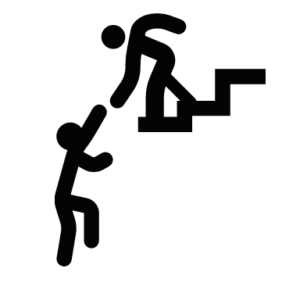 Helping verbs (sometimes called auxiliary verbs) are, as the name suggests, verbs that help another verb. They provide support and add additional meaning. Here are some examples of helping verbs in sentences:
Helping verbs (sometimes called auxiliary verbs) are, as the name suggests, verbs that help another verb. They provide support and add additional meaning. Here are some examples of helping verbs in sentences:
- Mariah is looking for her keys still.
- Kai had checked the weather three times already, but he looked one more time to see if the forecast had changed.
- What ever happens, do not let the water level drop below this line.
As you just saw, helping verbs are usually pretty short, and they include things like is, had, and do (we’ll look at a more complete list later). Let’s look at some more examples to examine exactly what these verbs do. Take a look at the sentence “I have finished my dinner.” Here, the main verb is finish, and the helping verb have helps to express tense. Let’s look at two more examples:
- By 1967, about 500 U.S. citizens had received heart transplants.
- While received could function on its own as a complete thought here, the helping verb had emphasizes the distance in time of the date in the opening phrase.
- Do you want tea?
- Do is a helping verb accompanying the main verb want, used here to form a question.
- Researchers are finding that propranolol is effective in the treatment of heartbeat irregularities.
- The helping verb are indicates the present tense, and adds a sense of continuity to the verb finding.
- He has given his all.
- Has is a helping verb used in expressing the tense of given.
The following table provides a short list of some verbs that can function as helping verbs, along with examples of the way they function. A full list of helping verbs can be found here.
| Helping Verb | Function | Examples |
|---|---|---|
| be | Express tense (the tense depends on the conjugation of to be; is is present, was is past, will be is future, etc.) and a sense of continuity. | He is sleeping. |
| Express tense (the tense depends on the conjugation of to be; are is present, were is past, will be is future, etc.) and indicate the passive voice | They were seen. | |
| can | Express ability | I can swim. Such things can help. |
| could | Express possibility | That could help. |
| do | Express negation (requires the word not) | You do not understand. |
| Ask a question | Do you want to go? | |
| have | Express tense (the tense depends on the conjugation of to be; are is present, were is past, will be is future, etc.) and indicate a sense of completion | They have understood. |
| might | Express possibility | We might give it a try. |
| must | Express confidence in a fact | It must have rained. |
| should | Express a request | You should listen. |
| Express likelihood | That should help. | |
| will | Express future tense | We will eat pie. The sun will rise tomorrow at 6:03. |
| would | Express future likelihood | Nothing would accomplish that. |
The negative forms of these words (can’t, don’t, won’t, etc.) are also helping verbs.
Practice
Identify the helping verbs in the sentences below:
- Damian can’t work tonight. Do you want his shift?
- Cassandra couldn’t afford to give up.
- Richard was exercising when Barbara finally found him.
Candela Citations
- Revision and Adaptation. Provided by: Lumen Learning. License: CC BY-SA: Attribution-ShareAlike
- Revision and Adaptation. Authored by: Gillian Paku. Provided by: SUNY Geneseo. License: CC BY: Attribution
- Auxiliary verb. Provided by: Wikipedia. Located at: https://en.wikipedia.org/wiki/Auxiliary_verb. License: CC BY-SA: Attribution-ShareAlike
- Basic Patterns and Elements of the Sentence. Authored by: David McMurrey. Located at: https://www.prismnet.com/~hcexres/textbook/twsent.html. License: CC BY: Attribution
- Image of helping figures. Authored by: BenPixels. Provided by: The Noun Project. Located at: https://thenounproject.com/search/?q=help&i=462225. License: CC BY: Attribution
